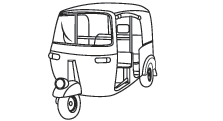The United Socialist Party (Sinhala: එක්සත් සමාජවාදි පකෂය, Eksath Samajavadi Pakshaya, Tamil: ஐக்கிய சோசலிச கட்சி, Aikkiy soōcialica Kaṭci) is a Trotskyist political party in Sri Lanka. The party is led by perennial presidential candidate Siritunga Jayasuriya. It is affiliated with the Committee for a Workers' International.
United Socialist Party එක්සත් සමාජවාදි පකෂය ஐக்கிய சோசலிச கட்சி | |
|---|---|
 | |
| General Secretary | Siritunga Jayasuriya[1] |
| Founded | 1989 |
| Split from | Nava Sama Samaja Party |
| Headquarters | 53/6, E. D. Dabare Mawatha, Narahenpita, Colombo 05 |
| Newspaper | Rathutharuwa / Sentharakai (Red Star) |
| Ideology | Socialism Trotskyism |
| Political position | Far-left |
| International affiliation | Committee for a Workers' International (2019) |
| Colours | Red |
| Election symbol | |
Trishaw | |
| Website | |
| www.lankasocialist.com | |
History edit
The USP traces its origins back to the main leftist opposition faction within the Lanka Sama Samaja Party, the Vama Samasamaja. This group was introduced to what was to become the Committee for a Workers' International (CWI) in the 1970s.[2] The Vama Samasamaja became the Nava Sama Samaja Party when it split from the LSSP in December 1977 following a number of expulsions from the LSSP starting in 1972.[citation needed]
The NSSP was a section of the CWI from its foundation until it left in 1989. Disagreements on areas of theory and policy (such as the analysis of Stalinism) with the CWI eventually led to a second split.[3] One disagreement was over the leaders' support of the controversial Indo-Sri Lanka Accord, signed in 1987, which led to the deployment of the Indian Peace Keeping Force, in a document issued on 12 February 1988.[4] After 1989, the NSSP became a member of the United Secretariat of the Fourth International, while those still supporting the CWI split from the NSSP to form the United Socialist Party.[citation needed]
Opposition to the Sri Lankan Civil War edit
The USP criticised the Indian government for providing military support to the Sri Lankan government, whose armed forces were conducting a campaign against Tamil separatist rebels in the north of the country.[5] The party opposed the Rajapaksa government's militarist solution to the country's civil war, holding the position that military victory in the Tamil-dominated areas would not solve the national question, with ill feelings and further violence likely to erupt as a result. USP General Secretary, Siritunga Jayasuriya, is also quoted with saying that the government's military operation was a "war not against LTTE cadre, but against the Tamil people."[6]
Electoral history edit
Presidential edit
| Year | Candidate | Votes | % | Result |
|---|---|---|---|---|
| 2005 | Siritunga Jayasuriya | 35,425 | 0.36% | Lost |
| 2010 | Siritunga Jayasuriya | 8,352 | 0.08% | Lost |
| 2015 | Siritunga Jayasuriya | 8,840 | 0.07% | Lost |
| 2019 | Siritunga Jayasuriya | 3,944 | 0.03% | Lost |
In the 2005 presidential elections, USP candidate Siritunga Jayasuriya came third place, winning 35,425 votes (0.36%).[7][8]
Other edit
In the 2006 council elections, the USP won 710 votes (2.37%) in Eheliyagoda Pradeseheeya Sabha (Ratnapura District), winning a seat in the council.[9][10]
References edit
- ^ "EPRLF calls for re-merger of north and east". Daily Mirror. 21 July 2014. Retrieved 24 December 2017.
- ^ Trotskyism and Reformism Today, marxist.net. 17 August 2007. Retrieved 24 December 2017.
- ^ Taaffe, P. (2004) A Socialist World Is Possible, London: CWI Publications pg.75.
- ^ Moorthy, M. "A lost opportunity for Left in Sri Lanka", Militant International Review, Number 39 Spring 1989.
- ^ India should stop all military aid to Sri Lanka, JESA, 19 February 2009. Retrieved 24 December 2017.
- ^ "India should pressure Sri Lanka for a political solution". The Hindu. 22 October 2008. Retrieved 24 December 2017.
- ^ "United Socialist Party (cwi) comes third in presidential election". socialistworld.net. 18 November 2005. Archived from the original on 10 June 2007. Retrieved 17 August 2007.
- ^ "Presidential Election 2005: Dawn of a new era". Sunday Observer. 24 January 2010. Archived from the original on 14 September 2014. Retrieved 7 June 2013.
- ^ "United Socialist Party (CWI) wins council seat". socialistworld.net. 31 March 2006. Retrieved 24 December 2017.
- ^ "Elections and the menace of war". socialistworld.net. 29 May 2006. Archived from the original on 30 September 2007. Retrieved 17 August 2007.